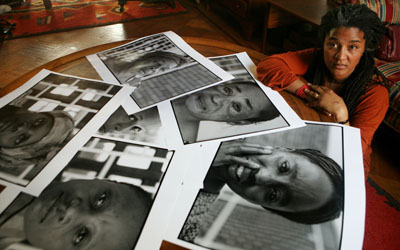March 8 marks the 100th anniversary of International Women’s Day. To commemorate the achievements and ongoing challenges women face in some of the world’s most devastating conflicts, Enough is publishing profiles each day this week of women doing exceptional work to end atrocities and support survivors in Congo, Sudan, and LRA-affected territory.

“Because I Had To”
I am a storyteller by trade. I remain committed to telling the stories of women of the African diaspora, particularly those stories that don’t often find their way into the mainstream media. Sexual violence against the women of Congo is one of the great human rights crises in the world today, and I am using the tools that I have at my disposal to raise awareness and draw attention to the situation; those tools are my imagination and my storytelling skills. I feel the onus is on all of us who have the ability to reach audiences to try and bring an end to the scourge. I cannot bear to live in a world where such horrific things are happening to my African sisters without doing whatever I can to help them. Silence is complicity. I believe that. Our silence on this issue sends a message to the Congolese government that it can continue to rape the land and its people with impunity. Our silence on this issue means that every time we use cell phones, we are inadvertently fueling a war that is being fought on the backs of women.
Why did I go to Africa to collect their stories? Because I had to.
When Lynn Nottage, the playwright of the 2009 Pulitzer Prize-winning play Ruined, first traveled to Central Africa to interview Congolese women seeking refuge in Uganda, she originally intended to write a modern version of Bertolt Brecht’s famous pre-World War II play Mother Courage, about “a wily businesswoman who does whatever it takes to survive a seemingly endless war,” as Nottage explains. But when she began hearing the testimonies of women who had survived rape in Congo, Nottage said she realized that she had the makings of a poignant story that deserved to be told in its own right:
In listening to the narratives of the Congolese, I came to terms with the extent to which their bodies had become battlefields. I felt that my play had to deal with the reality in a bold and direct way. The subject matter was not easy, but rape had become part of the vocabulary of war in Congo, and thus became a central theme in my play.
Nottage credits her time working at Amnesty International in New York as a young adult with teaching her that shining a focused light on an injustice can actually lead to tangible change. While at Amnesty International, Nottage began writing a book with Filipina author and human rights activist Ninotchka Rosca with the goal of making the case that women’s rights are human rights. Over the course of several years, they gathered testimonies and interviewed numerous women from around the world. Although the book was never completed, Nottage says that the intrepid, strong, and resilient women she encountered forever changed her. “I think that Ruined exists because of the journey that I took while at Amnesty International,” she said. Nottage concluded:
The power of the theater is that it can peel back layers of emotion to reveal human truths that often get lost in clinical human rights reports and detached news stories. In many societies you’ll find that theater is at the vanguard of change. The communal nature of the medium allows us to explore difficult and troubling subject matters that ultimately lead to some form of collective catharsis for the audience.
The profiles highlighted in this series were compiled for The Enough Moment, a book by John Prendergast and Don Cheadle about engaged citizens – known and unknown, in the U.S. and abroad – who are mobilizing to help end genocide, rape, and the use of child soldiers in Africa. Visit the Enough Moment Wall to hear people describe their “Enough moment” and to upload a video, photo, or written testimonial of your own.

